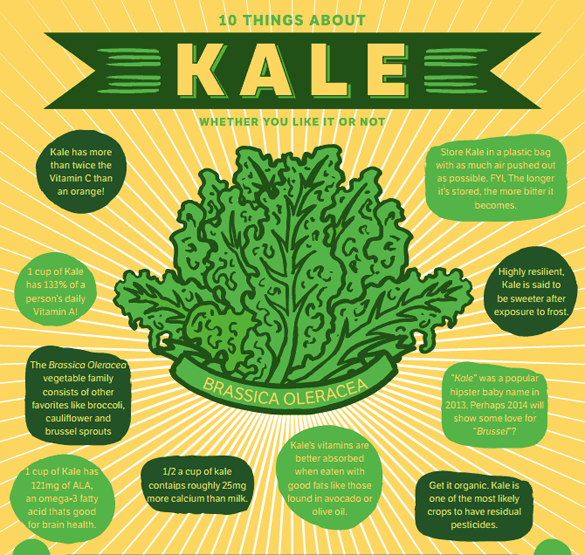Is Kale bad?
Kale (and other cruciferous vegetables, including cabbage, Brussels sprouts, broccoli, turnips, and collards) contain a compound called isothiocyanates, which appear to block an enzyme in the thyroid. This enzyme, TPO, is responsible for attaching iodine to the thyroid hormones to make them active.
Basically, these vegetables are thought to block your body from using the iodine that it needs. If the thyroid doesn’t have enough iodine, the cells start overgrowing and the thyroid gets bigger — this is called a goiter. That’s why these foods are often called “goitrogens,” because they make the thyroid swell as it’s trying harder to make your thyroid hormones with limited raw materials.
Kale and other cruciferous vegetables are only considered to be goitrogens when eaten raw. When these vegetables are cooked or lightly steamed, this issue goes away.
Does this mean you should never eat raw vegetables? Absolutely not!
After all, life is about balance, and nature would not have given us these bountiful plant foods if they weren’t good for us. If you always avoid these foods, your diet will be very restricted, and you would miss a lot of important nutrients.
Eating raw cruciferous veggies daily at 1 or 2 meals is OK, and periodically doing a medically sound detox program is fine, too, as long as you’re getting enough iodine in your diet. Check out our free online “Supporting Your Liver with Detox” here.
While this is not scientifically based on studies, my usual recommendation is to avoid eating or juicing raw cruciferous veggies more than two meals each day. (Though you can certainly eat more raw kale than this if you were doing a cleanse, for a short period of time.)
Focusing on increasing your iodine intake will help you supply your thyroid with what it needs, and this can offset the goitrogen effect from these foods. Now you can see why the main strategy to preventing a goiter from occurring due to eating raw foods, is to make sure you are getting enough iodine every day! So how should you do this?
The following Brassica, or cruciferous, vegetables contain isothiocyanates and when eaten RAW and in LARGE amounts, may interfere with your thyroid function, especially if your diet is low in iodine.
- Arugula
- Bok choy
- Broccoflower
- Broccoli
- Broccoli rabe
- Broccoli sprouts
- Brussels sprouts
- Cabbage
- Cauliflower
- Collard greens
- Kale
- Kohlrabi
- Mustard greens
- Napa Cabbage
- Radish
- Swiss chard
- Turnip
- Watercress
To be sure you’re getting enough iodine to counteract this effect, take a multi-mineral or, alternatively, increase your intake of foods rich in iodine (like iodized sea salt, seaweed, saltwater fish, and shellfish).
Sprinkling kelp, dulse or nori flakes on your food, or adding a strip of kombu when cooking soups, stews, beans, pasta, rice or quinoa will also provide iodine. Remove the kombu when finished cooking and the minerals will remain in the food.
You can also do a juice or food/juice cleanse for several days, and not worry about hurting your thyroid. The minerals and antioxidants in the foods and drinks will offset this, and you should continue to take a multi-mineral while you do this. After the cleanse, go back to your iodine-rich diet and enjoy raw foods. (But not every meal!)
Remember, we’re talking about LARGE amounts of RAW cruciferous vegetables! When you lightly steam these foods, the issue goes away. Isothiocyanates are very important for detoxification and elimination of carcinogens, therefore, we still recommend eating at least one cup of cruciferous vegetables daily, whether cooked or raw.

